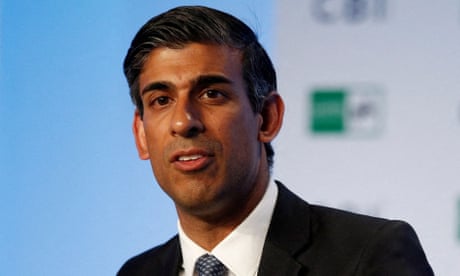Rishi Sunak has announced a £15bn package of support for households struggling with the cost of living crisis, part-funded by a £5bn windfall tax on energy companies.
The chancellor set out what he called a “significant set of interventions” to help offset the impact of rocketing inflation.
These will include a £650 one-off payment for families on means-tested benefits, and an extra £200 for all energy bill payers that will not have to be repaid.
The package will be partly funded by what Sunak called a “temporary, targeted energy profits levy” – a windfall tax.

“The oil and gas sector is making extraordinary profits, not as the result of recent changes to risk-taking or innovation or efficiency, but as the result of surging global commodity prices driven in part by Russia’s war,” he said.
He therefore announced what he called a “temporary, targeted energy profits levy” of 25% but with a 90% tax relief for firms that invest in oil and gas extraction in the UK.
Sunak said he was also “urgently evaluating” the scale of excess profits made by electricity generators.
Responding to Sunak’s statement in the House of Commons, the shadow chancellor, Rachel Reeves, said his adoption of a windfall tax showed Labour was “winning the battle of ideas in Britain”.
“Today it feels like the chancellor has finally realised the problems that the country is facing. We first called for a windfall tax on oil and gas producers nearly five months ago to help struggling families and pensioners. Today he has announced that policy but he can’t dare say the words. It’s a policy that dare not speak its name,” she said.
Sunak told MPs: “The high inflation we are experiencing now is causing acute distress for the people of this country.” Annual inflation hit 9% in April, the highest rate for 40 years.
He said the public would understand that ministers could not offset all of the increase in prices. But he said: “This government will never stop trying to help people”, adding: “We will get through this.”
“We will send directly to around 8 million of the lowest-income households a one-off cost of living payment of £650 – support worth over £5m – to give vulnerable people certainty that we are standing by them at this challenging time,” the chancellor said.
He also announced that more than 8 million pensioner households that receive the winter fuel payment would receive an extra £300, while 6 million disabled people would get a one-off payment of £150.
He said one-third of households would receive the targeted support, which is worth £9bn in total.
In addition to the targeted support, all households would receive an extra £200 discount on their fuel bills in October, in addition to the £200 already promised.
But in a U-turn on the rebate scheme announced in February, Sunak said households would now not need to repay this £400 in the coming years. Previously, they had been expected to repay the discount over the coming five years.
Sunak said spending measures to tackle the crisis had to be “timely, temporary and targeted” to avoid stoking inflation.
He set out the plans just two months after giving a spring statement that was criticised across the political spectrum for failing to do enough for the poorest households.
The energy regulator, Ofgem, warned earlier this week that the annual price cap limiting household power bills was likely to rise by a further £800 in October, after the £700 increase in April.
Several cabinet ministers, including the energy secretary, Kwasi Kwarteng, had previously expressed opposition to a windfall tax, an idea that has been advocated by Labour and the Liberal Democrats.
But the Treasury and No 10 have increasingly warmed to the idea as it became clear they would have to take more action to offset the once-in-a-generation increase in household energy bills.
At last, let us hope that this tax carries on. It is obscene that these companies are making such huge profits and getting tax concessions when normal people struggle to find the money to pay for everyday costs.
The blog song for today is: "Telephone line" by ELO
TTFN



No comments:
Post a Comment